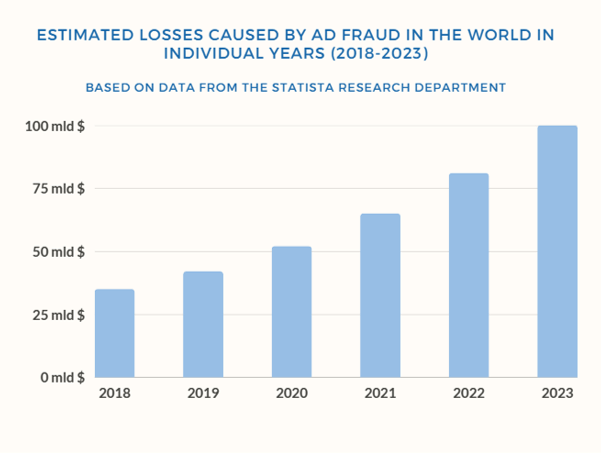Ad Frauds in 2023 - trends and forecasts

source: own elaboration
How much money did advertisers lose to Ad Frauds last year? It is not known exactly, but according to Juniper Research estimates, it was about USD 68 billion worldwide, and Statista writes about even USD 81 billion. That’s more than a third of the amount advertisers across the US spent on digital advertising in 2022. And what part of marketing budgets will Ad Fraud consume in 2023? Forecasts unanimously say that it will exceed 100 billion dollars. After all, digital advertising fraudsters won’t change their plans and aband their business, it is far too lucrative for it. So, this year they will do the same as before, but probably on a larger scale and using even better tools and technologies.
The ever-rising ad fraud rates have been identified as one of the top challenges facing the digital media industry this year, along with third-party cookie recalls and fake news. Research by eMarketer shows that for 52% of brands, fear of ad fraud is their top concern when it comes to in-app ads, and it was up to 57% when it comes to video advertising.
Ad frauds are not only financial losses - they reduce the effectiveness of individual campaigns, can influence the wrong decisions regarding entire marketing strategies and are often one of the main reasons why advertisers stop cooperation with a given partner.
Continual increase in losses caused by online advertising fraud.
According to the data published in January this year by the Statista Research Department, when comparing funds lost due to Ad Fraud in the last few years, a very strong upward trend is clearly visible. According to the research of this source, the industry lost $35 billion due to online advertising fraud in 2018, a year later, in 2019, - $42 billion, in 2020 - $52 billion, in 2021 - $65 billion, and in 2022 – $81 billion. The expenditure on Ad Fraud in 2023, estimated by the Statista Research Department, is as much as $100 billion. Until 2021, the increase in losses caused by online advertising scams remained below or at $10 billion year-on-year (in 2019 - $7 billion, a year later, in 2020 - $10 billion), but from 2021 the increases are much higher - from 13 in 2021, through 16 in 2022 to the forecasted 19 billion dollars this year. This increase is shown in the chart below.
Image 1. Chart showing estimated losses caused by ad fraud worldwide from 2018-2023
The same source also provides data on the advertising fraud rate worldwide. According to statista.com, in the second quarter of 2022, globally, as much as 17 percent of all ad views were fraudulent. This was an increase of 1.4% compared to the last quarter of 2021 when a similar indicator was at the level of 15.6%.
New marketing trends vs Ad Fraud.
Although programmatic advertising is very convenient and allows you to optimize the buying and selling of advertising space on the Internet, its widespread use can unfortunately work to the advantage of fraudsters. It is enough for them to discover how the algorithm works and manipulate it accordingly, and they often have better knowledge and equipment than many marketing teams. The machine has no sense and doesn’t see „red flags”, if it receives the right set of data, it won’t look for irregularities in them. Let us also note that marketers don’t create such algorithms or programs for programming campaigns themselves, but adapt the existing ones, offered by external suppliers, to their needs. Thus, fraudsters don’t have to cope with millions of algorithms, it is enough for them to figure out the most known, widely available ones.
The mobile channel, which is getting a bigger piece of the marketing pie every year, is also conducive to ad fraud. With so many apps constantly running on mobile devices, it is easy for fraudsters to generate fraudulent clicks, impressions and downloads undetected, which they then sell to advertisers. Mobile advertising scams are expected to become even more common and sophisticated in the coming years. However, that’s not all - at the same time, fraudsters operating in the mobile channel will also be better organized and equipped, which will make their activities even more difficult to detect.
But not all marketing trends favor fraudsters. To help expose and prevent ad fraud, internet giants like Facebook and Google have been using neural networks and machine learning for some time now. AI can spot suspicious behavior, filter IP addresses, and generally monitor traffic effectively. There is also increasing talk about the use of public key cryptology to confirm the identity of publishers and advertisers.
And what can smaller businesses do to protect themselves from ad fraud?
It is important to remember that we aren’t helpless in the face of the growing number of Ad Frauds - however, the cooperation of all entities related to online marketing is necessary, i.e., advertisers, publishers, technology providers, marketing agencies, affiliate networks, advertising platforms, and even Internet users themselves.
First of all, advertisers should use tools to verify and validate traffic, fraud detection and prevention platforms, etc. Although it seems like a lot of money, in fact solutions of this type protect advertising budgets. We also encourage you to implement strict anti-abuse policies, such as allowing only trusted sources to place ads, setting strict budget limits for campaigns, and immediately terminating publishers and other partners who commit fraud.
Publishers, on the other hand, should make sure they use the right technology to protect their assets and ensure the legitimacy of their traffic sources.
Tech companies must constantly develop new methods to detect and prevent ad fraud. They also actively educate the industry and provide the resources necessary for advertisers and publishers to protect against fraudsters.
When it comes to marketing agencies, affiliate networks and advertising platforms - all these entities should devote a large part of their activities to protection against Ad Fraud. Their task must be to verify the publishers and partners they work with, as well as how they generate traffic, and to improve the tools offered to both advertisers and publishers (such as providing statistics to detect fraud). In addition, these companies, as they act as an intermediary, can easily disseminate information about ad frauds.
After all, Internet users themselves can also do a lot - reporting not only every fraud, but also suspicious activity or irregularities that they notice. Their influence can be crucial in the fight against ad frauds, with one caveat - other entities must enable them - contact with a given company should be simple and quick, and each report should be treated seriously.
One of the most frequently mentioned marketing trends for this year (although mainly on foreign markets) is the active fight against advertising fraud, and not sweeping the problem under the carpet so that a given brand is not associated with the subject of ad fraud. Now, when every zloty (or dollar) spent on online marketing matters, advertisers are finally going to say NO to scammers who have been stealing from them with impunity for years. What will be the effects of this different approach to fraud in the online advertising market? We’ll probably find out soon.


